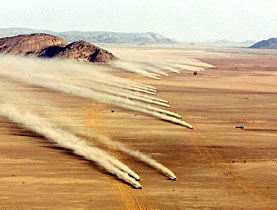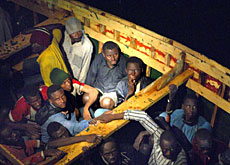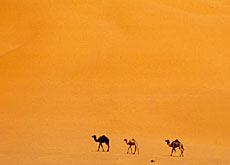Dakar Rally faces uncertain future

The Dakar Rally may never again be held in Africa after its sudden cancellation due to safety concerns and terror threats, a Swiss competitor has warned.
Philippe Cottet is one of two Swiss motorcycle riders who were due to leave Lisbon, Portugal on Saturday for the start of the 9,000-kilometre race across the Sahara Desert to Dakar, Senegal.
For the first time in its 30-year history, the annual rally was called off on Friday because of safety concerns in the African republic of Mauritania.
In a statement, the organisers of the automobile, motorbike and truck endurance race blamed international tensions, the recent slaying of four members of a French family in Mauritania and “direct threats against the race issued by terrorist groups”.
“Following several consultations with the French government and taking into account its firm recommendations, the organisers of the Dakar have taken the decision to cancel the 2008 edition of the rally,” said the Amaury Sport Organization. “No other decision but the cancellation of the sporting event could be taken.”
“It’s a huge sporting and personal disappointment, as it’s been an enormous amount of work to get to the start line; and this morning I’m told to go home,” Cottet told swissinfo. “I really don’t think it’s a good decision as it means the terrorists have won.”
The 36-year-old Swiss rider from Collombey-Muraz in canton Valais said the bad news had come as a big surprise to most people, especially so close to the start of the race.
“Nobody could have imagined that it might have happened,” added Cottet, who was due to take part in his fourth Dakar and was aiming at a top-20 finish.
Little information
France, where the race organisation is based, had urged the rally to avoid Mauritania. The warning came after the killings of the four members of a French family in an attack blamed on a terror cell that uses the Mauritanian desert as a hideout.
Cottet complained the organisers hadn’t given out any details about precisely what the direct terrorist threats might be.
“As competitors, we should have been given a bit more information to help justify the decision,” he said.
The race had been due to start on Saturday and finish in Senegal on January 20. Eight of the rally’s 15 stages were due to pass through Mauritania.
Around 550 competitors – cars, trucks and motorcycles – were expected to take part in the 9,270-kilometre trek.
The race’s central appeal – its course through African deserts, scrubland and savannahs – is also a weak point for security, making it difficult to protect thousands of people as they traverse such remote regions.
No zero risk
Cyril Neveu, a five-time Dakar winner in the motorcycle category, acknowledged that terrorists could have targeted the race.
“Providing security from the first to the last competitor is an onerous job,” Neveu added. “One cannot say that there was no risk.”
French ministers had discussed safety at the rally at a cabinet meeting on Thursday, and officials had met with race organizers to talk about the risks.
Only the father of the slain family survived the Christmas Eve attack, which took place in a town 250 kilometres east of the Mauritanian capital as its five members picnicked on the side of a road.
That attack was followed by another four days later, when three Mauritanian soldiers manning a checkpoint were killed. Mauritania is a largely peaceful Islamic republic that has been rocked by the back-to-back killings.
Authorities have blamed a terror “sleeper cell” linked to the Algeria-based al-Qaida in Islamic North Africa group for the murders of the family. Al-Qaida in Islamic North Africa claimed responsibility for the killing of the soldiers.
The Mauritanian government had announced last week that it would mobilize a 3,000-man security force to ensure the race’s safety. The country’s foreign minister on Friday complained that cancelling the race was not justified.
swissinfo, Simon Bradley
The Dakar Rally, formerly known as The Paris Dakar and now as The Lisbon Dakar Rally, is an annual off-road endurance race, organised by the French-based Amaury Sport Organisation. The race is open to amateur (80%) and professional entries.
The first race was held in 1979; in the beginning, the rally was from Paris, France to Dakar, Senegal, however, due to politics and other factors, the course, including origin and destination, have changed over the years.
The rally has been held uninterrupted since 1979 although there have been regular calls for its cancellation over security fears and the danger the fast-driving vehicles pose to local populations. Criticism has also been directed at the rally’s impact on the inhabitants of the countries through which it passes and the environmental effects.

In compliance with the JTI standards
More: SWI swissinfo.ch certified by the Journalism Trust Initiative



You can find an overview of ongoing debates with our journalists here. Please join us!
If you want to start a conversation about a topic raised in this article or want to report factual errors, email us at english@swissinfo.ch.